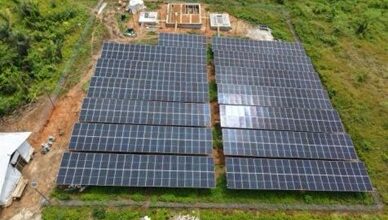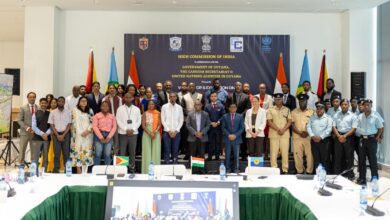Your Excellency Sir Colville Young, Governor General of Belize,
Honourable Said Musa, Prime Minister of Belize
Madame Speaker of the Assembly
Honourable Ministers
Members of the Assembly
Member of the Diplomatic Corps
Deputy Secretary-General of the Caribbean Community
Distinguished Guests
Staff of the CARICOM Secretariat
Members of the Media
Ladies and Gentlemen
It is indeed an honour and a pleasure for me, as Secretary-General of the Caribbean Community (CARICOM), to be here in Belize to participate in the deliberations of this the Third Sitting of the Assembly of Caribbean Community Parliamentarians – the ACCP.
I wish to thank the Government of Belize and particularly the Speaker of the National Assembly and her staff for doing all within their power to ensure our comfort and a productive meeting. I was particularly impressed by the considerable effort that went into the organisation of this Sitting of the Assembly at a time when the country has had to be preoccupied with the process of national rehabilitation following Hurricane Keith.
I am assured that in this effort, Madame Speaker, you had the full support and co-operation of both His Excellency the Governor General and the Honourable Prime Minister, seized as they were of the importance of the deliberations of this august body within the CARICOM framework. On behalf of all present, and indeed those not present, please accept our deepest appreciation for the valuable contribution to this event.
Madame Speaker, in view of this clear commitment on the part of Belize to the evolution of participatory democracy within the regional integration process, we of the Secretariat of the Caribbean Community are determined more than ever to support your efforts. Also, I am pleased to note that after a somewhat slow start in the naming of delegations, in part due to doubts by some Member States of Belize’s capacity to host this event, given the ravages which they learnt were wrought by Hurricane Keith, we have still here with us representatives of nine of the thirteen CARICOM Member States party to the Agreement Establishing the ACCP.
Madame Speaker, as you are aware, the Assembly of Caribbean Community Parliamentarians was established following a decision by the Community’s supreme decision-making Authority – the Conference of Heads of Government. The Assembly was created in 1994 as a deliberative and consultative body for broadening the dialogue on, and stimulating greater public awareness of, regional integration issues given the vital importance of that process to the future development of our societies. After the Inaugural Meeting in Barbados in 1996, the Second Sitting did not take place until 1999 in Grenada where, following the sterling efforts of the Grenada Parliament, we had a most successful meeting. It is our hope that the momentum generated by that meeting will continue so as to ensure that the Sittings of the Assembly become a central item on the annual integration calendar.
And I do not say this lightly, Madame Speaker, for as we move to deepen the integration process through the implementation of the Single Market and Economy, the role of the Parliament becomes critical. You the Parliamentarians are a vital conduit to the people of this Region in whose name we make decisions. You understand their concerns, you reflect their views and you take back to your constituencies an understanding of the main workings and issues of CARICOM and how these affect the daily lives of the people. Of equal importance to the success of the integration process is your input into the regional debate. We are recognizing that realistic decision-making and the successful implementation of these decisions depend in a large part on promoting dialogue on the issues within civil society, including within the national and regional Parliaments. In this regard, the Caribbean Regional Integration Process is in no way unique.
Perhaps one of the most powerful voices in European integration is now the European Parliament and even Latin America whose democracy is of much more recent vintage, has created similar institutions. Moves are afoot to reportedly do the same in Africa. It was in full recognition of the reality of the importance of the involvement of the wider civil society in the process of regional integration that Heads of Government, at their Special Meeting in Chaguaramas in October 1999 agreed to convene in 2001 an Encounter with wide-ranging participation from civil society, to interchange ideas on a strategy for the development of the Region and its peoples. They also agreed that the political Opposition should be brought as partners into the consultation process on regional integration.
This principle of promoting participatory democracy at the regional level is also enshrined in the Charter of Civil Society adopted in 1997 wherein Member States have declared their determination “to create a truly participatory environment within the Caribbean Community which will be propitious to genuine consultation in the process of governance”. This was exactly what was intended by the Conference of Heads of Government when it created this body.
This is what the Heads of Government signaled that they expected of this body when at their Seventh Special Meeting in Chaguaramas in Trinidad last October, they not only adopted without modification a resolution adopted by this body on as important an issue as the Guyana/Venezuela Border question.
This position by the Heads of Government recognizes not only the value of the democratic principles in the development of our Community but also the critical importance which the growth and development of our institutions represent in the achievement of the viable Caribbean Community to which we all aspire and to which we are all committed. But it is only with the effective functioning of such institutions that the Region can hope to experience that contribution. In that regard, it is therefore crucial for all – Heads of Government, Member States, Government Ministers, Members of Parliament – to play their full part in ensuring that the institutions we create are fully supported to ensure that they make the contribution for which they were designed. This body in particular remains in need of that wholehearted support.
In this process, I venture to say, that you Parliamentarians yourselves must take the lead. You must attend the meetings; you must indicate the issues to which you attach great significance and must therefore find a place on the Order Paper; you must speak to the issues; you must inform your colleagues at home on return and you must not allow the Secretariat to go to sleep on issues relating to the Assembly between Sittings of the body. As Parliamentarians, this is your body and it is for you to take charge of it, build it and make it into the primary democratic body, which it is, among the institutions of the Community. This is my fervent plea.
This brings me to another issue of some concern and I refer to the fact that all Member States of the Community need to be treated with the same degree of care. It is true that some Member States may be geographically located further away from the Community Headquarters and the majority of other Community Member States. But being geographically on the periphery does not mean that the Member State cannot be in the centre circle of Community activity. In fact, Belize is proving that that is achievable. One can hardly ignore the fact that one of this year’s three recipients of the highest honour of the Community – the Order of the Caribbean Community – was awarded to an outstanding Belizean, the Rt. Honourable George Price, former Prime Minister of Belize and one of the early pioneers of Caribbean integration. He has our warmest congratulations. Of course it is also well known that the current Deputy Secretary-General is a Belizean and few may know that the Secretary-General’s newly recruited Public Relations Officer is also of Belizean stock.
But Belize is achieving all this against a background of significant odds. For example, there is no denying the inconvenience of having to spend two days of travel between Belize and other CARICOM States, not to mention having to obtain a Visa to journey through a non-Community Member State. Would it not be a significant achievement if, arising from the deliberations of this body, there were to be successful initiatives resulting in travel linkage between Belize and Member States of the Community in a manner which avoids these difficulties?
Without a doubt, given the subjects on the Order Paper, this Sitting of the Assembly can make a significant contribution to the development of CARICOM. There are many critical issues; perhaps the most critical issues facing the Caribbean Community are on your Order Paper. The Community’s flagship undertaking; the implementation of Single Market and Economy, including the establishment of the Caribbean Court of Justice; the major social challenges facing especially our young people – HIV/AIDS, Substance Abuse, Youth Unemployment, etc.; the Role of Women in Politics; External Threats to our Regional Economy are among the many issues on which the people of the Community await your views.
I invite you, Honourable Parliamentarians, not only to recognize the strategic moment at which we are, in the building of our Caribbean Community, but also to shoulder your responsibility thereto, thereby preparing a future for our children worthy of their highest aspirations.
I wish you a very informative, vibrant and successful two days of discussions.
Permit me in closing to address a few words to the Honourable Prime Minister. We of the Secretariat like the rest of the Community were deeply saddened by the loss of life and damage to property wrought by Hurricane Keith on our Belizean brothers and sisters. So deeply did we feel that notwithstanding our limited resources – indeed the time of year as well – we all decided to make a very modest contribution from our limited pockets as a demonstration of oneness and solidarity with our Belizean brothers and sisters.
It is now my pleasure to hand over to you a cheque for somewhat over half a million Guyana dollars. We wish we could have sent more!
I thank you.





